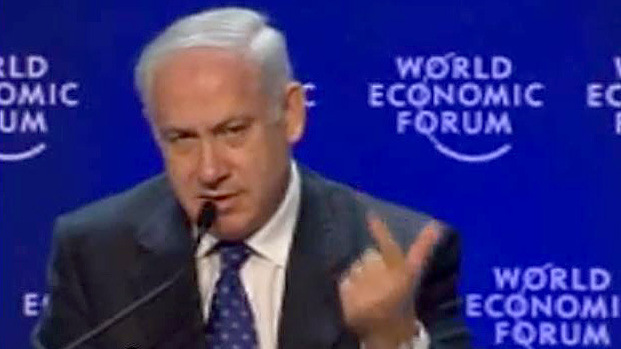
Will Israeli Prime Minister Benjamin Netanyahu meet Iran´s President Hassan Rouhani at the World Economic Forum in Davos? (World Economic Forum)
Summary
Indications of new settlements for the Middle East are peeking around the corner. From our point of view those potential developments are logic, because everything else would bring about chaos over the whole region. Chaos that could easily spread like wildfire and get out of hand. No major player can afford that.
Hawks can make decisions
On January 17, 2014, Israeli Prime Minister Benjamin Netanyahu said, as reported by the Jerusalem Post, citing Canadian CTV News, he would consider meeting Iran´s President Hassan Rouhani if the latter recognized Israel´s right of existence.
Netanyahu assumed office in March 2009 for the second time in his political career, prompting the London-based Asharq Al-Awsat Saudi newspaper title: “Fasten your seat belts, Bibi is back.”
The headline was nicely chosen, but in his utterly negative attitude towards Netanyahu its author ignored an important fact of history: often, only hawks are able to extract concessions from their enemies – and their own following. They can pave the road to ceasefire and sometimes peace.
2014 will see some wild diplomatic and political races, with Netanyahu being one pilot behind the steering wheel. Guesses are, he will meet Rouhani at the World Economic Forum in Davos-Klosters, Switzerland, between January 22 and 25.
Rouhanis problems abroad and at home
President Hassan Rouhani of Iran is trying to navigate his country out of difficult waters.
Iran is suffering from sanctions, imposed by the West after the 1979 Tehran hostage crisis. The war with Iraq from 1980 to 1988 was draining. Iran´s youth and merchants want to see a more liberal political course.
Iran suffers from among the highest drug addiction rate in the world with its neighbour Afghanistan being the biggest opium producer worldwide.
Rouhani is most importantly in the ring for a difficult bout with a hardheaded and conservative clerical elite that looks at his endeavours with great suspicions.
The Revolutiounary Guard stands to loose. Beside their military power – similarly to the Egyptian military during the recent uprising – its leaders see their economical fruits wither.
With prospects of an atomic deal and lifting of sanctions, international dealers and companies are gearing up for competition that will cut down the Guard´s profits.
Averting the long black tunnel
Netanyahu and Rouhani are both piloting within a frame of regional dynamics that could drag the Middle East into a dark tunnel for long or restabilize it after the shockwaves of the Arab Spring.
We stay with the estimation that a new accord on the Middle East is in the making (“Estimation and outlook on the situation in Syria and the region”, Beirutreporter.TV, May 27, 2013). There is just too much on the line for too many players to risk letting the region drift into mayhem.
Opponents vicious but rational
We think – though on the battlefield often vicious, brutal and seemingly out of mind – many players in the region from their point of view are acting absolutely reasonably. They are no kind fools as often portrayed in the media.
On the brink of total destruction many pull back. The Middle East has accumulated that kind of explosive potential during the recent years.
That is why we think something big for the Middle East is being discussed behind closed doors. Something that will bring under control the Arab Spring and its tremors, which continue to leave cracks in many areas of the region. Questions are: what might it be and in which shapes is it going to see the light of the day?
New shape of regional power and guarantees for Israel
Our estimation is that big and regional powers like the United States, Russia and Iran are negotiating a settlement that gives Iran and Russia a bigger sphere of influences, while guaranteeing Israel´s integrity and right of existence. How this will play out in detail remains to be seen.
There is something coming that could shape the power structure of the Middle East for a long time. 2014 bears the potential to become the year of turnarounds.
Uneasy choices
Many players won´t be happy with such development, but they all work under certain constrains, the big part of which they can´t easily shun without becoming irrelevant and a potential prey for others in the future.
This is the first part of our small series “2014 – Year of turnarounds in the Middle East”. In the next part we will look into the options of other countries like Lebanon, Syria and Turkey.
